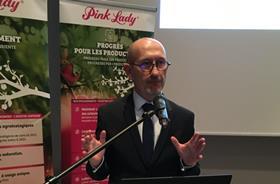
As much of the world orders lockdowns and curfews for its citizens to curb the spread of Covid-19, food companies like Pink Lady Europe are tasked with the great responsibility of ensuring supplies continue to reach the shelves.
According to Thierry Mellenotte, CEO of the Pink Lady Europe association, packing stations continue to run to keep up with demand, but staffing and packaging supplies may eventually fall short, especially if weather conditions are unfavourable.
Due to a warm winter, trees are blooming early, which puts them at greater risk to pests and frost, which has already hit regions including the Alps in southern France and South Tyrol.
“There are also concerns that this cold snap could lead to slower pollination, since bees are only active in conditions over 12oC,” said Mellenotte. “There has been no noticeable damage so far, but the staffing shortage could also make it difficult to manage the orchards during this period, which is when the netting needs to be opened and pheromone dispensers installed in order to disrupt codling moth mating. These measures are absolutely critical to protect the harvests.”
The Pink Lady Europe network has so far sold 116,000 tonnes of Pink Lady, or PinKids, apples – three quarters of its stockpiles for the season.
Employees of the 85 packing stations still operational in France, Italy and Spain are working assiduously in order to meet the demand of retailers and wholesalers across Europe.
Due to a shortage of personnel and materials, including packaging items, which have encountered some supply problems, Pink Lady staff across the network have banded together to resolve issues, while sharing best practices for employee health and safety.
“We are especially proud of all our employees and partners (at packing stations, authorised distributors, producers and nurseries), who have banded together to continue operating and supplying their customers with the same quality of service, while protecting the health and safety of workers above all,” said Mellenotte. “Now more than ever, respect and solidarity are essential. Everyone at APLE is working hard to get our teams through this period. Beyond this difficult time, the whole team is already shifting its attention to a post-Covid world and the possible repercussions in terms of consumption, consumer expectations, how we think of trade and how we might work differently with distributors or structure our companies — and perhaps change the way we work.”



